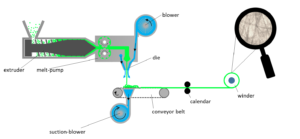meltblowing
The meltblown process (see Fig.) Is a modified form of melt spinning, in which the drafting air is replaced with warm cooling action. The polymer strand emerging from the nozzle is directly drawn through hot air flowing in the exit direction of the filaments. This air flow causes the fibers to remain in a molten state for a longer time than the normal melt spinning line. The fibers produced accordingly have a smaller fiber diameter of 1-30 microns, which is essential for applications in the field of filtration, for example. Thus, in the field of this highly relevant industrial process, a wide range of research opportunities arise.

Another aspect that makes the research of the meltblown process industrially relevant is the cooling profile and the resulting crystallization of the polymer. The fibers produced, depending on the processing and air temperature, may exhibit large deviations in their mechanical properties, which may be application-specific relevant.
The deposition of the fibers in the meltblown process is in turn very similar to that of melt spinning. In most cases, the entangled by the air flow fibers are deposited on a wire belt, which is coupled in this case with a suction fan to dissipate the hot air. By depositing a fine fleece can be produced from entangled polymer fibers, which can then be wound up and optionally calendered before winding up if necessary. Other types of filing have already been tested.
In the industrial application and the research work of the chair especially polyolefins, polyamides and thermoplastic polyurethanes are used in this process.
